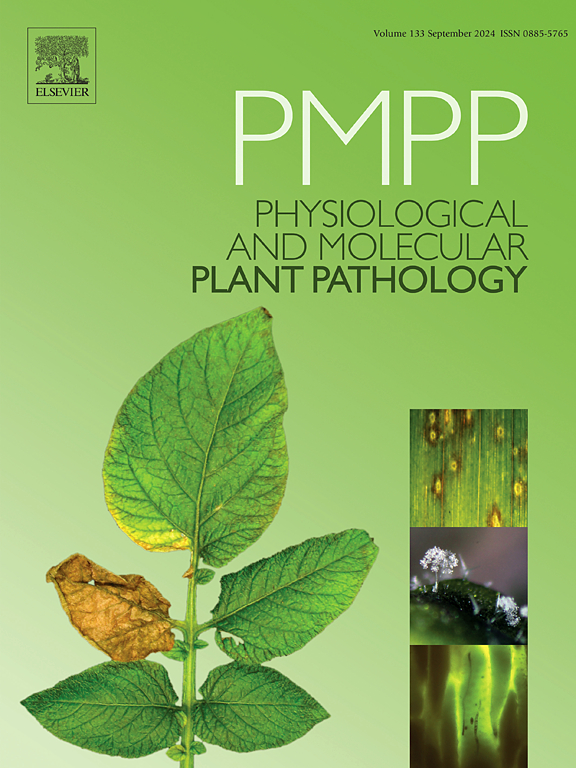Chitosan nanoparticles loaded with jasmonic acid induce plants’ resistance against Botrytis cinerea
IF 3.3
3区 农林科学
Q2 PLANT SCIENCES
引用次数: 0
Abstract
Today, there is a growing need for environmentally friendly and sustainable compounds to manage plant diseases. The application of plant defense inducers is a promising eco-friendly strategy to combat fungal pathogens. Chitosan nanoparticles are polymeric, bio-based carriers of active compounds that are widely used in plant protection. In this study, we demonstrate that chitosan nanoparticles loaded with jasmonic acid (JA-CNPs) effectively induce the jasmonic acid defense pathway and reduce the severity of infection caused by the necrotrophic fungus Botrytis cinerea (strain B05.10) on Αrabidopsis thaliana and tomato leaves by 51 % and 45 %, respectively. To assess defense responses, a β-glucuronidase staining (GUS-staining) experiment was conducted using the PDF1.2:GUS A. thaliana transgenic line, demonstrating that JA-CNPs effectively induce the jasmonic acid (JA) pathway at a low concentration of 5 ppm. This effect remained evident even after artificial inoculation with B. cinerea conidia. Confocal microscopy revealed reduction of hyphal development of the pathogen in Arabidopsis leaves treated with 5 ppm JA-CNPs, when compared to control conditions. In vitro bioassays revealed that JA-CNPs did not directly affect B. cinerea conidial germination, reinforcing their role in defense induction in A. thaliana. Furthermore, transcriptional analysis of COI, ASK1, AXR1, and JAH3 in A. thaliana, as well as AOX, PME1, CHS1, and BOA3 in B. cinerea, revealed that JA-CNPs application influences key components of the plant's JA pathway and challenges the virulence mechanisms of the fungus, respectively. Overall, these findings highlight the potential of JA-CNPs as a promising tool for the control of B. cinerea, contributing to minimization of chemical fungicides in crop protection.
负载茉莉酸的壳聚糖纳米颗粒诱导植物对葡萄灰霉病的抗性
今天,越来越需要对环境友好和可持续的化合物来管理植物病害。植物防御诱导剂的应用是一种很有前途的生态友好的对抗真菌病原体的策略。壳聚糖纳米颗粒是高分子活性化合物的生物基载体,在植物保护领域有着广泛的应用。在这项研究中,我们证明了负载茉莉酸的壳聚糖纳米颗粒(JA-CNPs)可以有效地诱导茉莉酸防御途径,并将枯萎真菌灰霉病菌(菌株B05.10)对Αrabidopsis拟南芥和番茄叶片的感染程度分别降低51%和45%。为了评估防御反应,利用PDF1.2:GUS a . thaliana转基因品系进行了β-葡萄糖醛酸酶染色(GUS-染色)实验,表明JA- cnps在低浓度5 ppm下可有效诱导茉莉酸(JA)途径。这种效果即使在人工接种分生芽孢杆菌后仍然明显。共聚焦显微镜显示,与对照条件相比,5 ppm JA-CNPs处理的拟南芥叶片菌丝发育减少。体外生物实验表明,JA-CNPs不直接影响灰芽孢孢子萌发,增强了其在拟南芥中诱导防御的作用。此外,通过对拟南芥中COI、ASK1、AXR1和JAH3,以及拟南芥中AOX、PME1、CHS1和BOA3的转录分析,揭示了JA- cnps的应用分别影响了植物JA通路的关键组分,并挑战了真菌的毒力机制。总的来说,这些发现突出了JA-CNPs作为一种有前途的控制灰霉菌的工具的潜力,有助于减少作物保护中化学杀菌剂的使用。
本文章由计算机程序翻译,如有差异,请以英文原文为准。
求助全文
约1分钟内获得全文
求助全文
来源期刊
CiteScore
4.30
自引率
7.40%
发文量
130
审稿时长
38 days
期刊介绍:
Physiological and Molecular Plant Pathology provides an International forum for original research papers, reviews, and commentaries on all aspects of the molecular biology, biochemistry, physiology, histology and cytology, genetics and evolution of plant-microbe interactions.
Papers on all kinds of infective pathogen, including viruses, prokaryotes, fungi, and nematodes, as well as mutualistic organisms such as Rhizobium and mycorrhyzal fungi, are acceptable as long as they have a bearing on the interaction between pathogen and plant.

 求助内容:
求助内容: 应助结果提醒方式:
应助结果提醒方式:


